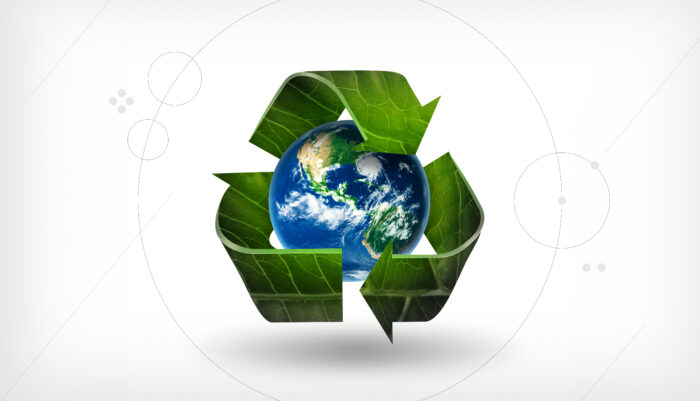The Circular Economy: How Recycling Transforms Waste into Resources
11.28.2023
11.28.2023

In circles that regularly discuss new ways to be environmentally conscious, one concept that often comes up is the circular economy. A circular economy is not just an eco-friendly buzzword used by environmental activists — it is a concept that has recently gained traction with entities that wish to lessen their impact on the Earth. This includes reducing their dependence on natural resources and reusing resources that are already circulating in the economy, which is where recycling comes in.
Effective and responsible recycling can contribute to a circular economy, a healthier planet, and even to the overall economy. Let’s take a closer look at why this is the case. In this blog, we will discover what exactly a circular economy is, the role of recycling in the circular economy, the environmental and economic benefits of a circular economy, and Verdeco’s contribution to circularity through creating innovative and practical recycling solutions.
To grasp the idea of a circular economy, we need to discuss waste and pollutants. You’re probably already familiar with some of the daily activities that contribute to waste creation — driving a car releases emissions into the air, throwing away trash adds to landfills, turning on the AC uses energy… the list goes on. A circular economy aims to cut back on the need for resources and the creation of harmful waste by addressing the root of the issue. In a circular economy, people, businesses, and other entities take action to prevent the need for and use of natural resources.
This sounds great in theory, but practically, what actions are taken to put a circular economy in place? A few examples of circularity that people are already doing include ridesharing, switching to hybrid and electric vehicles, using reusable grocery bags, buying locally grown food, and composting, just to name a few. Some larger companies have also promised to cut down on their natural resource consumption by committing to using sustainable packaging that requires fewer materials and implementing green energy into various areas of their business.
While all of these actions are incredibly helpful, there is still much work to be done to reach full circularity. The current global economy is only 7.2% circular, and there is still a lot of ground to cover, which will take a lot of creativity and practical innovation. One area that has seen some incredible and transformative developments in contributing to a circular economy is recycling.
For a circular economy to work effectively, recycling must be implemented so reusable materials are transformed into useful products once again. Recycling comes into play at the end of the typical usable cycle for materials, and it ensures that these materials do not end up in landfills or as litter on roadsides and in waterways. Recycling is crucial in making sure that reusable materials never become waste, which is a major goal for a successful circular economy. Not only that, it also keeps materials in circulation for as long as possible — further reducing the need for raw materials.
Reaching a circular economy is a worthy goal for many reasons, especially when you consider the benefits that can be realized from its implementation. Many of these benefits fall under one of two main categories, environmental and economic.
Some of the most obvious upsides to a circular economy revolve around the environmental impacts. By reducing material consumption where it starts, less waste finds its way into landfills, and fewer pieces of trash can be littered into the environment, where they can cause significant harm. If there are no materials to litter or trash to begin with, in theory, then these problems are greatly reduced. Because of a drop in demand for natural resources to create virgin materials, this also means that extraction of these resources is also cut significantly, which also means that fewer CO2 emissions are released into the atmosphere. The environmental benefits of a circular economy have the potential to be incredibly impactful in a positive way.
Though it may sound surprising, there are also some economic benefits that could be realized from a circular economy — namely, an increase in jobs and saving money for consumers. Changing energy needs will lead to innovations and new technologies, which ultimately will result in more jobs being created. Additionally, when consumers have access to durable, reusable items that require less energy usage, this means that they can save money over time and have more spending power than they would with recurring costs for non-reusable products.
To reach a circular economy, we need solutions that address root issues and have practical applications that can be put into use right away. That’s why, at Verdeco, we drive innovation every day and create solutions that are pushing us towards circularity.
At Verdeco, we are contributing to a future circular economy with groundbreaking innovations in recycled PET. We are developing rPET solutions with the same properties and effectiveness as virgin PET, circulating PET back into the economy to be used again. Our focus on customer-driven solutions drives us to create industry-leading rPET that is indistinguishable from virgin PET — with the same aesthetics, structure, and quality. As the recycling industry develops and recycled products are used more widely, we see a future where recycled plastics will be just as common as virgin plastics on store shelves, keeping plastic out of landfills and oceans and in the circular, zero-waste economy where they belong.
To learn more about how Verdeco is changing the world, visit verdecorecycling.com.
Elevate your commitment to sustainability while upholding your high standards of quality. Talk with us today to discover the possibilities.